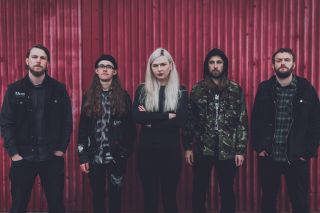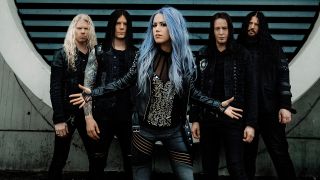Just how far can extreme music go? Arch Enemy put some sheen on the formula to become one of death metal’s most successful bands, while Venom Prison are getting widespread attention and festival main stage slots playing a more guttural, vicious strain of noise. But is there a glass ceiling on bands that have come from the underground? Alissa White-Gluz and Larissa Stupar team up to dissect extreme metal’s chances of smashing into the mainsteam – and how the face of the scene is changing…
How did you both discover extreme metal?
Alissa: “I grew up in a household where we all loved music. My sister was in a touring band, so we were exposed to a lot of grunge and punk music, but my initial exposure to metal was actually not that heavy. It was prog metal, like Dream Theater or something – I guess that is extreme in its own way! But I only really got into extreme music when I realised that I could do death metal vocals. I was experimenting with my voice, and it just sounded good! My band at the time was like, ‘Wow! You should do that in our songs!’ It was only then that I actually started exploring this sound and getting into bands that sounded like that.”
Larissa: “When I started listening to music, Nirvana were the heaviest band I listened to. Then I discovered Slipknot and they were the heaviest thing I had ever heard, and from there I just grew into punk and hardcore and death metal. I think Napalm Death were the band that stood out for me the most. They had the political message and the pace and the power. I had always wanted to be in a band but I could never do clean vocals, so first I was in a crustpunk band and then a hardcore band, and then I just started to discover more and more.”

So how extreme do your tastes go now?
Alissa: “It’s two opposite ends of the spectrum meeting in the middle. I had to learn to appreciate songs that are extreme and heavy, but that translate really well live. That’s why, for me, I like to write songs that are structured in a way that will translate live and on an album. I don’t want to tour songs for 10 years that just sound like mud live.”
Larissa: “I mean, we’ve only just started really, so I don’t know how far we can push it sonically. We don’t want to hurt anybody physically, and we’re not as loud as someone like Sunn O))) yet, so we do have room to push it. I don’t think there is a limit on extreme metal.”
Alissa: “Yeah, I don’t think I have a point where I’m like, ‘Nope, that’s too far now!’ If I like it, I like it.”
Larissa: “And metal is about power! Showing power and holding your audience captive. That’s something that we are trying to pursue live, because we are a loud band and we want people to be scared of us. We just want to be loud as fuck.”
Alissa: “And to me that is a really intriguing idea. It makes me want to learn about it more. But I understand that some people put up a wall because they don’t get it. Once you’re in the extreme metal community you realise that these scary experiences are an act of passion and that this is very sophisticated music. People who think this is stupid and that you just can’t hear what we’re saying or whatever…they just don’t get it yet.”

Is the stereotype that the extreme metal scene is mainly for long-haired dudes in spikes finally starting to buckle?
Larissa: “I see this scene as something of a haven for underdogs. We’re all underdogs in this scene; we listen to this music for a reason and we are all different for a reason. I see being a vegan, straight edge woman as being the ultimate underdog, and that’s why our music works so well. You combine extreme music and extreme views, and you get to live as yourself and give a piece of yourself to people.”
Alissa: “And I’ve never been pressured into being anything other than me. In this scene, no labels or managers have ever made me be anything other than myself; it’s a freedom that you don’t have in other genres. And it’s a risk! Once you say you’re a female, vegan, straight edge with blue hair you’re putting a target on your head for hate, because it’s different, you know? I was all of those things before I started a band, and that’s one of the best things about metal: that you can be political and you can care about things. In fact, you kind of have to care about things because so much passion goes into the music that you have to portray that through the lyrics.”
Larissa: “I’m sure Arch Enemy have made so many girls realise that they can be anything they want to be, and that’s why there has been this rise of women and girls bringing that new perspective. I think extreme metal is going to be accepted very soon in the near future, because we see popular culture always striving to take over the underground. It’s something new, cool and fresh. You see Napalm Death at Glastonbury! I think we’re on that path now.”
Alissa: “I think the rise in popularity of this extreme music that we’re seeing is because this is what the world needs right now. In a world full of Kardashians and valuing shoes and breast implants…like, whatever, do you if that’s what you like, but it’s horrifying to me that, not only girls, but guys as well, are being raised to think that the ideal of beauty is to be totally selfish and superficial and only value your looks. I think what the world needs is to see that screaming and being powerful and being from anywhere in the world and not being perfect is true beauty.”

Extreme music really is getting a bigger platform on the world stage at the moment…
Alissa: “Yes, and there is that Prime Minister in Indonesia who is a massive metal fan, and they’ve got murals of Ozzy Osbourne and Lemmy on public buildings. And they’re not ‘just there’, they have been commissioned by the government! That is such an amazing thing, to have someone in a position of such profile from our community.”
Larissa: “And Barney from Napalm Death wrote him a letter about the death penalty, saying, ‘I know you’re a fan of my band but I really don’t like the death penalty, can you do something about it?’”
Alissa: “That’s real power, that’s the power of this music. You know there is the part of us that wants to keep this music underground but I do think the world would be in a better place if this music was bigger. I think it’s a very positive thing, which is ironic because this music sounds so ‘negative’.”
So you’re all for extreme metal smashing the mainstream?
Alissa: “I’m open to the idea of larger exposure if it stays the same musically. I have so many people talk to me and I tell them I’m in a band called Arch Enemy, and they say, ‘Oh, cool, but what do you do for a living?’ I’m like, ‘I’m in a band!’ And they just haven’t been exposed to us yet. You listen to the radio and it’s no bands! When we started it was bands on the radio, now it’s just massive pop stars.”
Larrisa: “This is why DIY culture is so important in our scene, because no one is going to get a gig supporting Metallica or Suicide Silence if you’re an extreme metal band with no experience. You only get to play in those big venues if you have a booking agent.”
Alissa: “And it was so important to me to get that experience of playing when I was growing up in Montreal. We started in local venues to about 10 people and a few years later we were playing to 200! Those scenes were key to underground music, but we have the internet now, we’ve truly gone global. We’re underground but have a huge global community that you can access on social media, so we may have lost some of those smaller venues, but we have gained that.”
So the big question – can extreme metal make it to the big time?
Larissa: “It’s still underground at the moment, despite the steps we’ve made, and it’s a long way off before we can have an extreme metal headliner at a big festival. But I wouldn’t rule that out one day.”
Alissa: “I mean, I’m not sure I’ll ever see a grindcore festival pulling in 80,000 people…”
Larissa: “Unless it was in Indonesia!”
Alissa: “Yeah, maybe in Indonesia!”
Arch Enemy’s new album, Will To Power, is out September 8 via Century Media. Venom Prison’s Animus album is out now via Prosthetic


